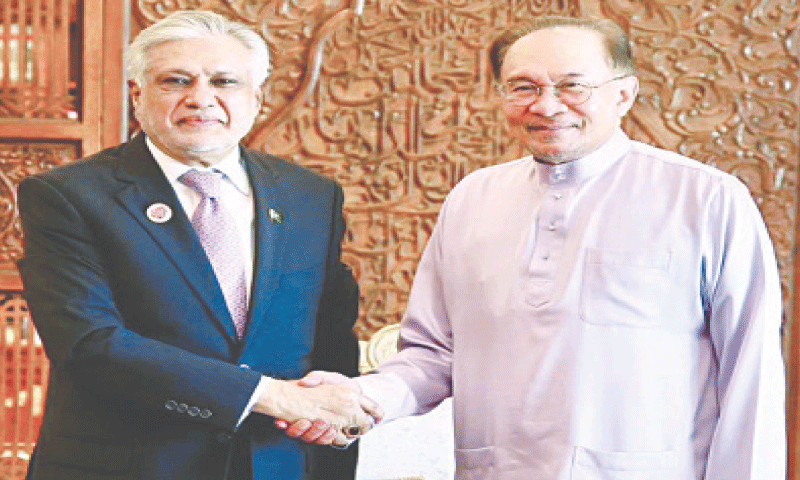• Warns against misuse of counterterrorism narratives to stigmatise Muslim communities
• Sees peaceful Afghanistan in Pakistan’s interest
• Meets Malaysian, Canadian, Australian, Cambodian and Vietnamese leaders
ISLAMABAD/KUALA LUMPUR: Deputy Prime Minister and Foreign Minister Ishaq Dar said on Friday the defeat inflicted by Pakistan has been difficult for the Indian political leadership to digest, Dawn.com reported.
Deputy PM Dar is leading the Pakistan delegation at the 32nd ministerial meeting of the Association of Southeast Asian Nations (Asean) Regional Forum (ARF), being held in Malaysia.
Addressing the Pakistani community in Kuala Lumpur, Mr Dar said that on the military side of matters, there was no issue between Pakistan and India as the armed forces had gone back to the mutually decided positions.
However, he said that the defeat inflicted by Pakistan has been difficult for the Indian political leadership to digest.
The deputy premier said Pakistan gave a befitting and measured response to Indian aggression. He stated that India sought to establish hegemony in the region, but Pakistan shattered its attempt through a measured response.
“Pakistan believes in peace and in building relationships based on equality, dignity and mutual respect,” he added.
Temporary ceasefire
Mr Dar said sometimes New Delhi said this was “a temporary ceasefire”.
“Pakistan neither asked for a ceasefire, nor would it. Neither did we initiate [hostilities] nor did we aggravate matters, and then, when they asked for a ceasefire, we agreed to it after settling the score.
“Otherwise, we wouldn’t have received a call requesting for a ceasefire at 8:15am, just half an hour after our operation ended at 7:45am, where they (India) said we are ready for a ceasefire,” he said.
Referring to the April 22 Pahalgam incident, he said, India blamed Pakistan without evidence and refused our offer of an impartial inquiry. Instead, it launched an unprovoked attack on May 7.
He detailed Pakistan’s response under Article 51 of the UN Charter, which targeted only military assets and demonstrated restraint and responsibility. He denounced the so-called new normal of unilateral military actions and impunity, asserting that peace must be rooted in mutual respect and international law.
Mr Dar also condemned India’s unilateral suspension of the Indus Waters Treaty, calling it a violation of international norms with grave humanitarian consequences.
Criticising India’s unilateral actions and aggression in the region, the deputy premier underscored the need for a just resolution of the Jammu and Kashmir dispute.
Referring to the country’s comprehensive counterterrorism approach and its efforts to expose cross-border terrorism, Mr Dar warned against the misuse of counterterrorism narratives to stigmatise Muslim communities and promote Islamophobia.
Non-traditional threats
On the other hand, he said, there was a need for global cooperation to ensure peace, justice and climate action in the face of mounting regional and international challenges.
He said ARF was a critical platform at a time when global fragmentation threatened multilateralism.
However, he urged focus on non-traditional threats, including climate change, pandemics, cyber risks, maritime security, and disaster response.
Reaffirming Pakistan’s backing of the One-China Policy, Mr Dar urged peaceful resolution of disputes in the Asia-Pacific, including the South China Sea, through diplomacy and mutual respect.
Mentioning the recent high-level engagements with Afghan leaders, Mr Dar urged the interim government to ensure its soil is not used against its neighbours. “A peaceful, stable, and united Afghanistan is in our vital interest,” he added.
He also condemned the Israeli aggression in Palestinian territories, calling for international action to halt atrocities and reaffirming Pakistan’s support for an independent Palestinian state with Al-Quds Al-Sharif as its capital.
Talks with Malaysian PM
On the sidelines of the 32nd ARF ministerial meeting, Mr Dar met Malaysian Prime Minister Dato’ Seri Anwar Ibrahim and the foreign ministers of various other countries, including Canada, Australia, Russia, according to the FO.
In his meeting with Malaysian PM Ibrahim, Mr Dar conveyed good wishes of Prime Minister Shehbaz Sharif and reaffirmed Pakistan’s commitment to deepening bilateral ties with Malaysia.
He also appreciated Malaysia’s leadership as Asean Chair for the year 2025. He also appreciated the practical steps taken by the Malaysian side for the promotion of trade and investment between the two countries, following Mr Ibrahim’s visit to Pakistan in October 2024.
Meetings with foreign ministers
At the weekly press briefing in Islamabad, the FO spokesperson said Mr Dar also met Canadian Foreign Minister Anita Anand, Australian Foreign Minister Senator Penny Wong, Russian Foreign Minister Sergey Lavrov and UK Foreign Secretary David Lammy.
Besides, Mr Dar met Foreign Minister of the Lao People’s Democratic Republic Thongsavanh Phomvihane, Sri Lankan Foreign Minister Vijitha Herath, EU High Representative and Vice President Kaja Kallas, and the Swiss Foreign Minister Ignazio Cassis.
Also, on the sidelines of the 32nd ARF, the deputy premier and his Cambodian counterpart Prak Sokhonn in a meeting agreed to intensify bilateral engagement, particularly in trade and investment, to hold dialogue at all levels and promote cultural and people-to-people contacts.
The deputy premier also invited Cambodian PM to visit Pakistan. It was decided that dates for his visit would be worked out through diplomatic channels.
In his interaction with his Vietnamese counterpart Bui Thanh Son, Mr Dar highlighted the untapped potential of bilateral trade and expressed Pakistan’s keen interest in building stronger commercial ties with Vietnam, one of Asia’s emerging economies. The two sides agreed to explore avenues for collaboration in sectors such as textiles, agriculture, technology, and tourism.
Mr Dar also accepted an invitation to visit Vietnam at a mutually convenient time, underscoring the momentum for increased high-level engagement between Islamabad and Hanoi.
With additional input from APP
Published in Dawn, July 12th, 2025
